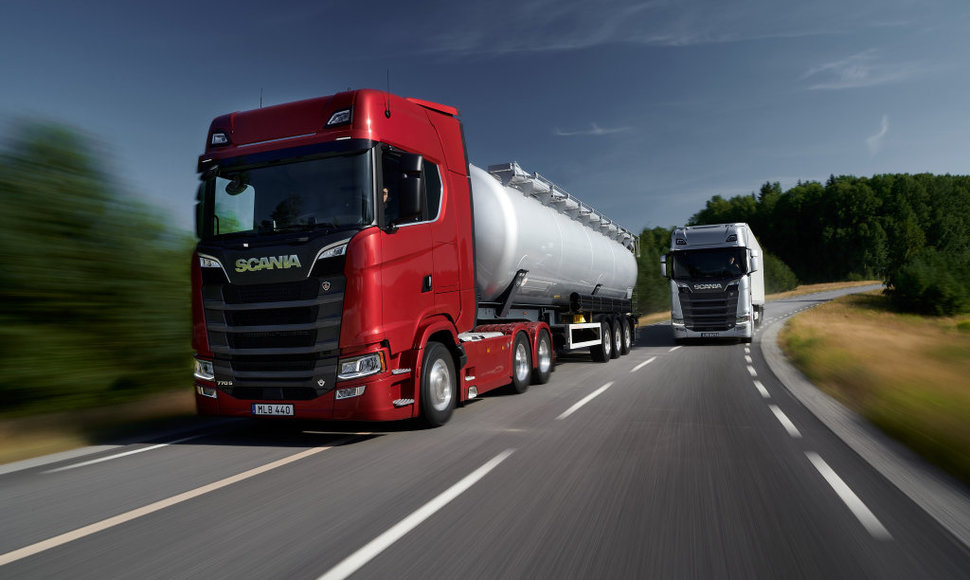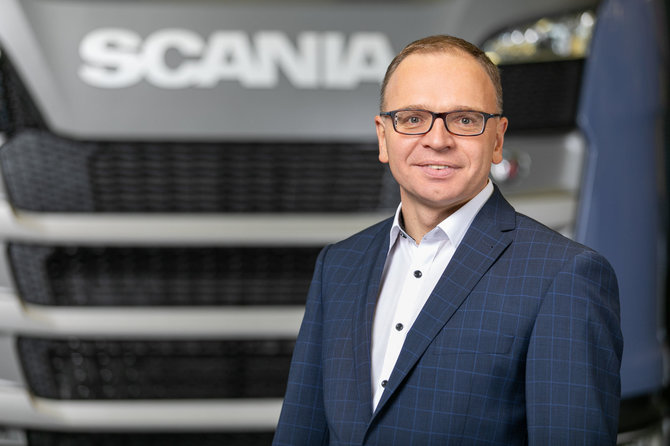In total, 4 thousand new trucks were registered in Lithuania last year, which is 3.4 thousand fewer than in 2019.
“As we predicted, with the Mobility Package coming into force, truck sales were reduced. This is a long-term effect, and the impact will be felt for quite some time, with the pandemic certainly having the largest short-term impact on the transport sector. During the first wave, the registration of new trucks in Lithuania and the other Baltic States fell by 60 per cent and a massive decline could be seen across the European Union. Later on, the situation stabilised, albeit not returning to its previous heights,” D. Snieška says.
New solutions in response to the pandemic
Scania Lietuva highlights the transfer of its internal processes and certain services into the digital domain as being among the most important factors, which helped adapt to the changed circumstances.
“The health of our staff and clients is our priority, and so we made great progress in digitising our processes. This way, we were able to ensure a safe environment and smooth work in light of the restrictions imposed during the lockdown,” D. Snieška says. Among new business solutions, he points out a used truck campaign launched by Scania across Europe, while according to the company’s representative, the rise of the pandemic halted the market’s growth. While most hauliers had previously planned expansion or renewal in 2020, with the situation on the market suddenly changing, investment in new vehicles appeared excessively risky.
“For those who did not abandon their plans of renewing their fleet of vehicles, used trucks became an excellent investment, which helped the company maintain its established direction of development. In response to the changed need of hauliers and the circumstances on the market, we offered an opportunity to purchase such trucks without initial investment, which allowed businesses to improve the quality of their services and the comfort of their employees. The company’s results exceeded expectations – compared to used truck sales in the same period for 2019, last year, we recorded a growth of 130per cent,” D. Snieška notes.
International haulage returns to normalcy
In terms of various transport sectors, D. Snieška highlights companies which carry passengers on inter-city and international routes as suffering the most during the pandemic.
“City passenger transport companies have recorded 20-30 per cent lower passenger flows. And in the inter-city and tourist passenger transport domain, passenger volumes have massively decreased, leaving most busses standing idle. Meanwhile, most international freight haulage companies are already returning to pre-pandemic order numbers,” explains D. Snieška.
Novelties of the year – most powerful engine and range of electrified trucks
In 2020, the Swedish heavy transport manufacturer introduced a number of novelties, as Scania took the title of creating the most powerful factory-built engine in 2019. This is a new member of the V8 engine family, featuring 770 horsepower and 3,700 Nm torque. It is effective where a great deal of power is needed, for example in forestry and quarries, as well as when performing long haulage in mountainous areas.
In 2020, Lithuania’s major cities had the opportunity to put on trial the first electrical Scania city bus Citywide. Scania also introduced fully electric and plug-in hybrid trucks for urban transport system. The V8 line of engines, known for its increased efficiency and reduced CO2 emissions, was also renewed.
“Scania has always maintained a consistent strategy in terms of electrification, such as introducing e-trucks to the market when the vehicle will be commercially appealing to its users. This time has arrived, and the trucks brought to market in 2020 immediately drew vast interest. With these vehicles, we are primarily entering sectors of distribution where distances aren’t quite as long as in international haulage. Nevertheless, our goal is to introduce at least one new electrical truck model every year, and so in the future, electrical-powered models will also appear in the long-distance haulage sector,” says the retail director for Scania Lietuva.
Focus on ecological solutions
There has also been other progress in terms of sustainability. Last year, more than ten Lithuanian transport companies tested Scania trucks powered by liquefied natural gas (LNG) under real-life conditions. Gas-powered engines help reduce CO2 emissions by 90 per cent when bio-gas is used. Scania has calculated that in countries such as Germany where road taxes are waived for ecological trucks, at maximum usage rates the truck can save up to 45 thousand euros a year.
“Increasingly many clients realise the clear advantage of ecologically sustainable vehicles, and the environmental impact parameters of the transport fleet are increasingly a question posed by haulage company clients as well. The business community is becoming more mature, and socially responsible behaviours are also gaining ground in the transport service sector. We can celebrate that in the near future, the first LNG refuelling station in Lithuania is expected and CNG infrastructure in Lithuania has been created and improving already. Vehicles powered by compressed gas suit most of the hauliers operating on the local or regional market, including those in the goods distribution, utility services, construction and other sectors, and all this can already be accomplished in Lithuania with ecological and sustainable vehicles,” D. Snieška emphasises.
In support of the development of ecological transportation, alongside infrastructure developers, Scania has also been creating solutions, which encourage a market breakthrough in the direction of sustainable transport. In 2021, the Dvire programme will continue, spanning favourable truck purchase, financing, maintenance and fuel purchase conditions. On the basis of this programme, gas-powered vehicle operating costs in Lithuania are lower than those of diesel-powered analogues.
This year, Scania Lietuva looks to continue focusing on the development and popularisation of sustainable solutions. The company plans to increase the number of services, which help more effectively make use of vehicles, and further accelerate the digitisation of maintenance services. It is planned to continue dedicating a great deal of attention to solutions in the local transport sector and their development.
Scania is a world-leading provider of transport solutions. Together with it’s partners and customers company is driving the shift towards a sustainable transport system. In 2019, Scania delivered 91,700 trucks, 7,800 buses as well as 10,200 industrial and marine engines to it’s customers. Net sales totalled to over SEK 152 billion, of which about 20 percent were services-related.
Founded in 1891, Scania now operates in more than 100 countries and employs some 51,000 people. Research and development are concentrated in Sweden, with branches in Brazil and India. Production takes place in Europe, Latin America and Asia, with regional production centres in Africa, Asia and Eurasia. Scania is part of TRATON SE.
Scania Lietuva has been operating since 2001, offering sales of Scania products, performing their technical maintenance and repairs in Vilnius, Kaunas, Klaipėda and Šiauliai, as well as offering product-purchase financing and other related services.













